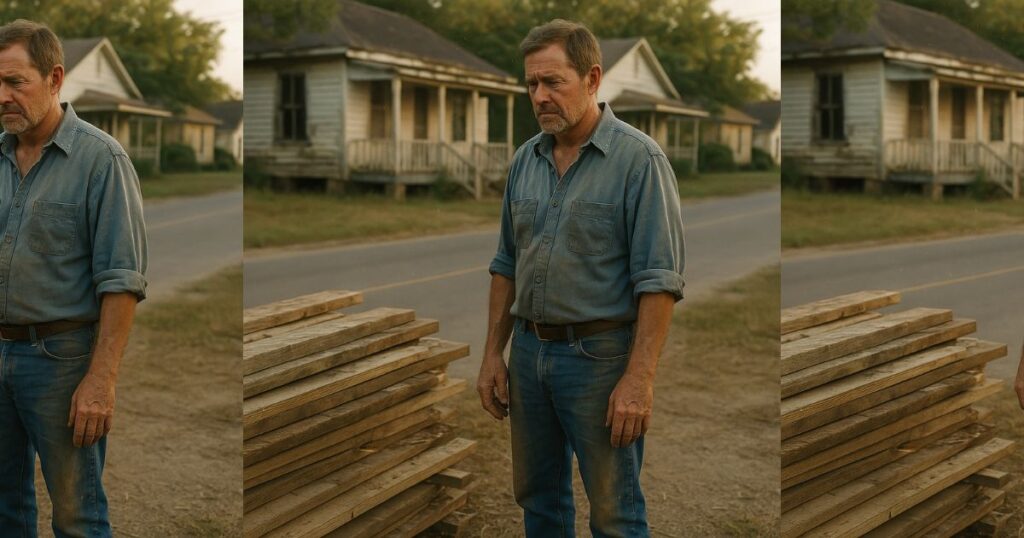The year after Katrina took my brother, I couldn’t drive past a pile of lumber without thinking of him.
Not just thinking—feeling. Like the smell of sawdust in summer heat could pull me backward through time, drop me right back into those weeks when we worked ourselves nearly to death.
I’m a carpenter from Mississippi. Been one my whole life. My hands were rough before I could shave. My two older brothers, Frank and Dale, were the same—only stronger, faster, better at everything that mattered in a shop or on a jobsite.
After the storm, when the TV crews left and the politicians moved on to shinier tragedies, there were still hundreds of houses leaning on their last nail. Folks were sleeping in mold, cooking on camp stoves in kitchens without walls.
Nobody asked us to do it. We just loaded our trucks with tools and went.
For weeks, the three of us moved like a single machine. Frank, with his cigarette dangling while he measured, calling out numbers without looking at the tape. Dale, who could cut a perfect angle with a circular saw one-handed, his other hand steadying a 2×4 against his knee.
And me—the youngest—running between them, hauling boards, holding ladders, driving nails until my shoulder ached.
We worked through the heat, through the rain. Ate peanut butter crackers for lunch. Slept in the back of the trucks sometimes, because driving home wasted daylight.
I remember one night, rain pounding the tin roof of a half-finished porch, and Frank saying, “If we get this done by tomorrow, she’ll be able to move her bed out of the damn hallway.”
That “she” was an old widow named Mrs. Connelly, whose kitchen ceiling had caved in. By dusk the next day, we’d given her back a room to cook in and a roof that wouldn’t leak.
We didn’t talk much about the storm itself. Didn’t have to. The work was the talking. Every nail driven, every plank cut square—that was our way of answering what the wind had done.
And maybe, in some quiet corner of my mind, I believed we were untouchable. That as long as the three of us kept swinging hammers together, nothing bad could reach us.
But Katrina didn’t stop when the news cameras turned off. The damp stayed. The mold stayed. And the cold, wet mornings worked their way into Dale’s lungs. He coughed for weeks, but never sat out a day. Said it was just the weather. Said he’d be fine.
By December, he wasn’t fine. By January, he was gone.
Pneumonia, the doctor said. Complications. As if “complications” explained the empty space in the truck, the silence where his laugh used to be.
Frank and I finished the winter jobs because we didn’t know what else to do. But it was different. Every board felt heavier. Every roof beam seemed to sag under more than its own weight. We stopped staying late. We stopped teasing each other over crooked cuts or bent nails. The work had lost its music.
That was years ago. The houses we built then are probably showing their age now—paint peeling, porches settling, shingles curling in the heat. And the two of us that remain?
We’ve got more miles in our bones than we care to count. Frank’s knees sound like dry kindling when he stands. My back tightens if I look at a ladder too long.
This afternoon, I was in my shop, working on a simple wall shelf for my daughter. Oak, sanded smooth, with little brass brackets. Nothing fancy. I had the last board clamped in place, ready for screws, when my hand just… stopped.
The sun through the high window hit the dust in the air, turning it to gold. I could hear the soft tick of the wall clock, the creak of the floor under my boots. And in that stillness, it hit me: this might be the last piece of wood I ever cut for someone I love.
I stood there, the screwdriver in my hand, staring at the board. And for the first time in a long while, I felt the weight of all those other boards—the ones we’d cut in the ruin after Katrina, the ones Dale had lifted, the ones Frank had set.
I realized what I miss most isn’t the work itself. It’s not even Dale, though Lord knows I miss him. It’s who we were then. Where we were. And the way we were—side by side, building not just walls, but something that outlasted the nails.
I tightened my grip on the screwdriver. But I didn’t turn it yet.


